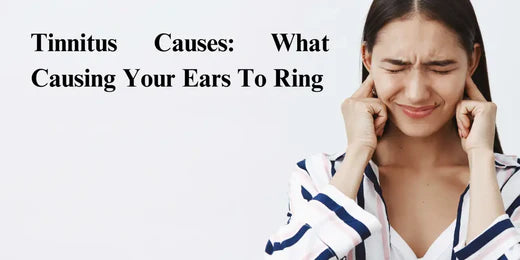
Tinnitus Causes: What’s Causing Your Ears to Ring?
Share
Have you ever experienced ringing in your ears but could not figure out why? These problems could develop gradually or appear suddenly after being close to a loud noise source. Occasionally, it might just be the loud noise source, but there might be an underlying cause. Let's have a look at some of these causes.
Tinnitus Causes

High-frequency hearing loss and tinnitus are frequently associated, but the relationship is more about how our brains adjust to inadequate auditory input than it is about actual ear damage. The precise relationship between tinnitus and irregularly firing brain cells is still unknown, but research, primarily on animals, points to this possibility. Since the symptoms of these brain changes often manifest immediately following exposure to loud noises, diagnosing them is challenging. Even though tinnitus can be a little mysterious, the following factors could be causing it:
- Loud Noises: A lot of people notice tinnitus after being around loud sounds, like at concerts or in noisy workplaces. It’s especially common among veterans who’ve been exposed to gunfire or explosions.
- Hearing loss: Losing your hearing, whether from getting older or being around loud noises, is often linked to tinnitus. But interestingly, not everyone with hearing loss gets tinnitus.
- Medications: Some medications can cause tinnitus, especially if you take them in high doses. This includes things like ibuprofen, certain antibiotics, cancer treatments, and some antidepressants.
- Earwax or infections: If your ear canal gets blocked by wax or fluid from an infection, it can trigger tinnitus.
- Injuries: A bump to your head or neck can mess with the ear structures or the nerves that send sound signals to your brain, leading to tinnitus.
Studies, mostly from animals, suggest that when certain brain cells start firing off more often and lose their usual rhythm, it might lead to tinnitus, although the exact relationship remains unclear. There are also some less common things that can contribute to tinnitus:
- Meniere’s Disease: This inner ear issue can cause tinnitus along with balance problems and hearing loss.
- Jaw Issues: Problems with the jaw joint, like clenching or grinding your teeth, can affect the area around your ear and make tinnitus worse.
- Tumours: Benign tumours on nerves that connect the inner ear to the brain can cause tinnitus, as can other tumours in the head or neck.
- Blood vessel issues: conditions like high blood pressure or blood vessel malformations near the ear can change blood flow and lead to tinnitus.
- Chronic Conditions: Things like diabetes, migraines, thyroid issues, anaemia, and autoimmune diseases like lupus and multiple sclerosis have also been linked to tinnitus.
However, occasionally, it seems as though tinnitus is happening for no apparent reason.
Table of Contents
Objective Tinnitus Causes
There are some possible causes of objective tinnitus, some of which are listed below.
- Vascular Abnormalities: abnormal blood flow in the cervical region, brain, or base of the skull could become a pulsatile tinnitus cause. This might occur due to vascular malformations, tumours, or other abnormalities in blood vessels.
- Muscular Contractions: objective tinnitus may occur due to abnormal contractions of the nasopharynx or middle ear.
- Blood flow: Objective tinnitus may result from blood flow through healthy arteries in the vicinity of the ear.
- Respiration: Objective tinnitus may result from respiration from a patulous Eustachian tube.
Subjective Tinnitus Causes
Subjective tinnitus is linked to abnormalities in the auditory pathway and can arise from various factors, including:
- Noise trauma, including being around loud noises from guns, machinery, or concerts.
- Ear diseases Conditions like Meniere disease, otitis media, or lesions on the eighth cranial nerve.
- Medications, including aspirin and some prescription drugs like antihypertensives.
- Metabolic diseases, which include diabetes, hypertension, and heart disease.
- Ageing naturally can have various causes.
- Migraines can trigger tinnitus.
- Cerumen impaction is caused by excessive earwax production.
- Blockage of the Eustachian tube occurs when something gets lodged in it.
- Head or neck trauma can result in tinnitus.
- Thyroid problems, including thyroid-related hormonal imbalances.
- Vitamin B12 deficiency can lead to tinnitus
Causes of Tinnitus in One Ear Only: Unilateral Tinnitus.

One can easily treat a number of conditions that cause unilateral tinnitus, such as cerumen impaction (earwax buildup). However, it is sometimes indicative of more serious underlying conditions that may lead to permanent hearing loss, especially if accompanied by neurological symptoms such as hearing loss and vertigo. Some unilateral tinnitus causes include:
- Accumulation of ear wax
- Loud noises, like explosions or really loud sounds close to your ear
- Regular exposure to loud sounds, like working around heavy machinery or construction
- Cholesteatoma, which is an unusual skin growth in the middle ear
- Otosclerosis, a condition that messes with the bones in your middle ear
- Chronic ear infections, where fluid keeps hanging around in the ear
- A perforated eardrum, which is when the eardrum gets a tear
- Meniere's disease, which can lead to hearing loss over time
- A small hole in the ear canals, known as semicircular canal dehiscence.
Conclusion:
Although tinnitus can be a major source of discomfort, one's quality of life can be significantly improved by learning about its causes and practical management techniques. Making lifestyle adjustments like using sound therapy could all help reduce symptoms. Talking with medical professionals and making connections with people going through similar things can yield insightful information and support. Currently, there is no definitive cure for tinnitus; nevertheless, ongoing research continues to advance, offering hope for improved treatment options in the future. It is crucial to understand that you are not the only one going through this, and it can be helpful to keep an informed and resilient attitude.
Frequently Asked Questions
1. What causes tinnitus?
Tinnitus may be caused by a number of risk factors, including exposure to loud noises, earwax accumulation, medication, smoking, stress, and metabolic and ear diseases. There may also be additional factors, such as blood vessel problems, tumours, Ménière's disease, or some kind of chronic condition.
2. Which vitamin deficiency causes tinnitus?
Vitamin B12 deficiency can cause damage to the blood vessels and nerves in the ear that hampers the communication between nerves, which can lead to tinnitus. Deficit in Vitamin D is another vitamin that can cause tinnitus. It is crucial to eat a balanced diet to prevent illness.
3. Can stress cause tinnitus and ways to handle it?
It is possible that stress triggers tinnitus, which in turn triggers stress and anxiety, creating a vicious cycle. There are several ways for stress management, like yoga, meditation, or some breathing exercise. Getting enough sleep is also important.
